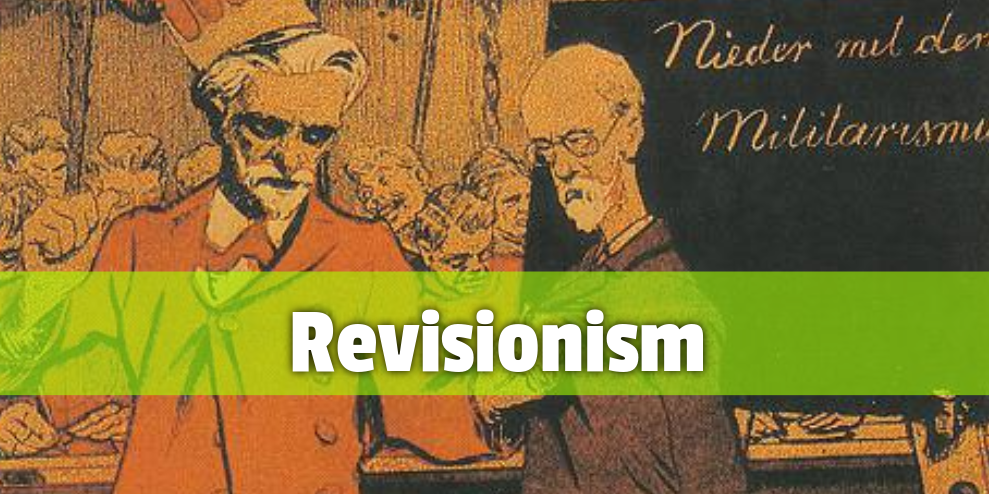Revisionism

Theoretical position appeared within the Second International that defended that capitalism had overcome or was overcoming its own contradictions, so it was imperative to make a "revision" of the Marxist foundations, renounce the revolutionary perspective and redefine the socialist parties as democratic parties defending social reforms.
Origins
Only two years after Engels' death, Bernstein, one of his literary executors, published in the "Neue Zeit", the theoretical journal of the SPD, a series of articles that would later appear as a book under the title "The Premises for Socialism and the Tasks of Social Democracy". This is the first theoretical argument for reformism. Its final conclusion: "The party should present itself for what it is: a democratic party of social reforms".
At first, the party leadership seemed reluctant to take the onslaught seriously. Kautsky, the magazine's director, gave the publication the thumbs up, but did not bother to come up with a response, citing lack of time and desire to argue. After all, Bernstein was a friend of "the hard years of the anti-socialist laws". In reality, with Marx and Engels dead, theory had lost centrality and weight in the daily life of the party. The real leadership of the movement fell to the parliamentary group, which was confused with the organic governing group and the trade union leaders. The role of scientific debates was now seen as little more than a cultural programme of the party, a specialised activity and basically useless as floral games which, at best, had the virtue of keeping impetuous young people and intellectuals with political aspirations busy without affecting the rank and file.
If opportunism had replaced consistent theoretical analysis in the setting of managerial goals, reformism was its unconfessed discursive daily life. The party secretary himself, Auer, an old demagogue who had been in office since 1875 and by now was a happy and well-established "pope," sent a famous secret letter to Bernstein, which would only be published decades later, reconvening him in the Jesuitical and cynical manner of the bureaucrats of all times:
My dear Ed, one doesn't formally make the decision to do the things you suggest, one doesn't say those things, one simply does them.
Ignatius Auer. Private letter to Edward Bernstein, 1898
So the silent reproach of the old social-democratic leadership to Bernstein was not for "revising" the Marxist programme, as his book intended, but for giving theoretical form to the reality of reformism that had eaten away at it, and whose core lay in the parliamentary group and the trade union leadership. The real danger for them was in a public debate on serious theoretical bases: they did not want to place the mass of party members, the famous rank and file, as judges, in order not to call into question the comfortable atmosphere of class conciliation that increasingly reigned in the institutions of the German state. Nor did any of them see the need to lower the revolutionary flag as Bernstein put it. Opportunism made it possible to combine a reformist practice indistinguishable from that of a petty-bourgeois party while keeping the most class-conscious part of the party within its grasp.
The first response would come from a young Polish woman, and therefore a Russian subject, who had recently taken refuge and was a German national, who was then 27 years old: Rosa Luxemburg. There were two articles, the first published in September 1898 in Leipzig, which would be republished as a book in 1900 under the title "Reform or Revolution".
The work became the main theoretical basis of the Left of the Second International, but it did not give way to a sincere and consequential debate, the party bureaucracy closing ranks against Bernstein as a way of not discussing its own opportunism. The 1889 SPD Congress in Hannover opened with a six-hour report by Bebel that turned the four days of debate into a real trial, almost a lynching, of Bernstein who was about to be expelled. The spectacle of the party's hypocritical public profession of faith was then repeated in the trade unions, with all the social democratic organizations reaffirming themselves without exception around the class struggle and the perspective of revolution.
The great theoretical and public defeat of Bernstein's revisionism was the great victory of the opportunism of the party popes and the trade unions. Like Auer, everyone thought and recognized in privacy that in reality the party was already as Bernstein proposed. But accepting it in front of the mass of working class militants and voters deprived them of the powerful image of being revolutionary daredevils contained only by an exercise of historical responsibility.
In reality, everyone believed the discussion was futile because practically no one shared the Marxist predictions anymore. They never thought that they would be facing a catastrophic crisis of capitalism, a world war of extermination and much less a global workers' revolution. And yet, when the time came, when the war broke out and they had to take sides, none of them hesitated for a single moment to close ranks with the bourgeoisie and its state.
Is there revisionism today?
No, just as there is no reformism: no one believes that the "reforms" proposed by the system's left will lead to socialism... they don't even pretend to do so.
http://dictionary.marxismo.school/Revisionism